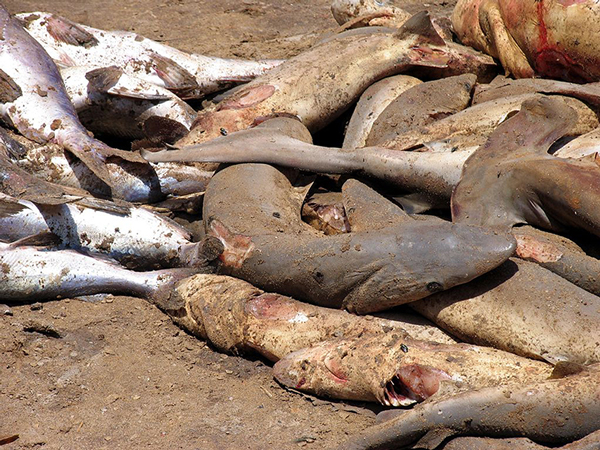Recent studies show a marked decline in the global shark-fin trade, and researchers believe that it’s all thanks to Chinese basketball superstar Yao Ming.
An eight-time NBA All-Star and center for the Houston Rockets from 2002 to 2011, Ming is one of China’s most successful athletes. Since his retirement from professional basketball, he has lent his support to several conservation initiatives, including an anti shark-finning campaign launched by WildAid in 2008. The campaign came as a response to the skyrocketing demand for shark fin in Ming’s home country, which scientists think to be responsible for the deaths of approximately 73 million sharks every year.
In Chinese culture, shark-fin soup is a delicacy traditionally served at important events as a symbol of status. Historically, only the wealthiest citizens could afford the dish, but in recent years, increased affluence and standards of living in China have created a higher demand for the soup. The fin trade is responsible in large part for the decline of shark populations around the world, leading to a drastic state of affairs whereby one in every four shark species is now classified as endangered.
In an effort to raise awareness of the sharks’ plight among the consumers responsible for their decline, WildAid launched their Yao Ming campaign in the months leading up to the Beijing Olympics. The purpose of the campaign, which boasted the slogan “When the buying stops, the killing can too,” was to educate Chinese citizens about the environmental and human health risks associated with eating shark-fin soup. By asking a trusted cultural icon like Ming to front the initiative, WildAid hoped to influence consumers in a way that no international non-profit had yet been able to do.
Advertisements featuring Yao Ming appeared no fewer than 3,250 times on Chinese state television in 2013, as well as on social media sites and public billboards. Other celebrities, including Jackie Chan, and actress Hai Qing also lent their support to the initiative, using their status as cultural icons to lend the campaign additional authority and prestige. In 2006, a poll of Chinese consumers reported that 75 percent of people questioned were not even aware of where shark-fin soup came from, perhaps because it is misleadingly known in Mandarin as ‘fish-wing soup.’
In contrast, a 2013 iResearch study found that 82 percent of respondents claimed that they would stop eating shark-fin soup, many of them as a direct result of Ming’s high-profile awareness campaign. Most cited animal cruelty concerns and an empathy for dwindling shark populations as the reason for their abstinence, while 91 percent of respondents said that they would support a nationwide ban on shark-fin products. Although such a ban has yet to take place, the Chinese government announced in 2013 that shark fin would no longer be served at state functions.
The positive results of Ming’s campaign are most clearly seen in China’s fish markets. In Guangzhou, the traditional epicenter of the country’s shark-fin trade, prices for fin dropped by 57 percent between 2012 and 2013. In neighboring Hong Kong, shark-fin sales dropped from 22.4 million pounds of fins sold in 2011 to 11.7 million pounds sold in 2013. Today, sales continue to fall and fishermen in source countries are feeling the pinch as a result. In Indonesia, for example, incomes from shark fishing have dropped by 80 percent since 2007, giving fishermen less and less of an incentive to target sharks.
This year, WildAid has taken Ming’s campaign to Hong Kong, Malaysia, Singapore and Taiwan in the hope that it will be able to inspire similar victories for sharks in those countries as well. Meanwhile, Ming is focusing his energies on helping other species brought to the brink of extinction by the demands of Chinese medicine and traditional cuisine. After traveling to Kenya to learn more about the devastation wreaked by elephant and rhino poaching, Ming is set to star in a new Animal Planet documentary called Saving Africa’s Giants with Yao Ming.


